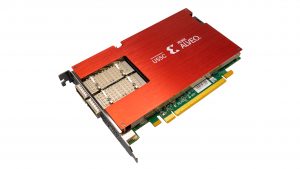Xilinx launches its accelerator card Alveo U55C

Xilinx introduced the Alveo U55C data center accelerator card and a new standards-based, API-driven clustering solution for deploying FPGAs at massive scale. The Alveo U55C accelerator brings superior performance-per-watt to high performance computing (HPC) and database workloads and easily scales through the Xilinx HPC clustering solution.
The Alveo U55C card combines many key features that today’s HPC workloads require. It delivers more parallelism of data pipelines, superior memory management, optimized data movement throughout the pipeline, and the highest performance-per-watt in the Alveo portfolio.
The Alveo U55C card is a single-slot full height, half length (FHHL) form factor with a low 150W max power. It offers superior compute density and doubles the HBM2 to 16GB compared to its predecessor, the dual-slot Alveo U280 card. The U55C provides more compute in a smaller form factor for creating dense Alveo accelerator-based clusters.
It’s built for high-density streaming data, high IO math, and big compute problems that require scale out like big data analytics and AI applications.
Leveraging RoCE v2 and data center bridging, coupled with 200 Gbps bandwidth, the API-driven clustering solution enables an Alveo network that competes with InfiniBand networks in performance and latency, with no vendor lock-in. MPI integration allows for HPC developers to scale out Alveo data pipelining from the Xilinx Vitis unified software platform. Utilizing existing open standards and frameworks, it’s now possible to scale out across hundreds of Alveo cards regardless of the server platforms and network infrastructure and with shared workloads and memory.
Software developers and data scientists can unlock the benefits of Alveo and adaptive computing through high-level programmability of both the application and cluster utilizing the Vitis platform.
The major AI frameworks like Pytorch and Tensorflow are supported, as well as high-level programming languages like C, C++ and Python, allowing developers to build domain solutions using specific APIs and libraries, or utilize Xilinx software development kits, to easily accelerate key HPC workloads within an existing data center.








